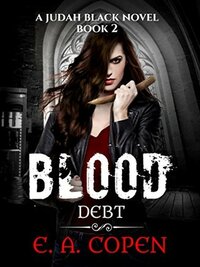Take a photo of a barcode or cover
Considering how much I loved Guilty by Association, despite my distaste for werewolves, I was chomping at the bit to read Blood Debt given my affinity for (...almost) all things vampires. And as I suspected, E.A. Copen's second entry in the Judah Black series doesn't disappoint, offering yet another action-packed mystery and enough character moments to add depth as well as bite.
Yes, that was totally intentional.
To my pleasant surprise, a fair number of players from the first book also appear in Blood Debt giving Judah's admittedly small world a much larger feel. Even so, there are enough newcomers to keep things fresh, including magick wielder Mara and the mysterious vampire-but-not-really-sorta-kinda Abe. As much as I enjoy Judah as a protagonist, having interesting side characters along for the ride turns an entertaining read into a certified page-turner.
The side stories are plenty -- almost too much so, as it felt like one of the side stories got dropped around midway through the book in favor of the main plot -- but again, they help flesh out Judah's character and world.
A common critique of the mystery genre (and a valid one) is that it often feels paint-by-numbers, that it hits all the typical notes without offering anything that would provide depth and/or resonance. Copen's series doesn't fall into this trap, and the result is a world that is simultaneously otherworldly and intimate. She's knee-deep in a world of monsters, yet the reality of her life is so intimately personal that the scope never once overwhelms the reader.
Blood Debt was a fantastic follow-up to Guilty by Association, and Copen has quickly established herself as one of my favorite indie authors. I'm anxious to read Chasing Ghosts and hopeful that the wait for the series' fourth installment is a short one.
Yes, that was totally intentional.
To my pleasant surprise, a fair number of players from the first book also appear in Blood Debt giving Judah's admittedly small world a much larger feel. Even so, there are enough newcomers to keep things fresh, including magick wielder Mara and the mysterious vampire-but-not-really-sorta-kinda Abe. As much as I enjoy Judah as a protagonist, having interesting side characters along for the ride turns an entertaining read into a certified page-turner.
The side stories are plenty -- almost too much so, as it felt like one of the side stories got dropped around midway through the book in favor of the main plot -- but again, they help flesh out Judah's character and world.
A common critique of the mystery genre (and a valid one) is that it often feels paint-by-numbers, that it hits all the typical notes without offering anything that would provide depth and/or resonance. Copen's series doesn't fall into this trap, and the result is a world that is simultaneously otherworldly and intimate. She's knee-deep in a world of monsters, yet the reality of her life is so intimately personal that the scope never once overwhelms the reader.
Blood Debt was a fantastic follow-up to Guilty by Association, and Copen has quickly established herself as one of my favorite indie authors. I'm anxious to read Chasing Ghosts and hopeful that the wait for the series' fourth installment is a short one.
Great sequel in the Judah Black series. It's not as good as the first one, but I still enjoyed it. New paranormal characters are introduced, a new murder mystery, and a bit of family drama. There is resolution at the end with the murder mystery, but there's still a cliff hanger which leads to a continuation of the series in the next book.
More reviews available at my blog, Beauty and the Bookworm.
Blood Debt is the second Judah Black novel, following Guilty by Association, which I read back in May and loved. GBA really reminded me of a Rachel Caine book, specifically one of the Weather Warden series, and that was the case here, too. I think the writing styles are very similar, and Judah and Joanne (Caine's heroine) have a lot in common, too, in that they're both humans with special abilities, but whose abilities still don't even rate on the same scale as the things they're up against. Now, Joanne is always getting turned into crazy things and so far that hasn't happened to Judah, but honestly, I think that's for the best, because it makes Judah's struggles seem all the more real.
BD starts about six months after GBA. In that time, Judah has had to deal with a slew of illegal fae immigrants, several of whom have gone missing, and has also picked up a mentee through a new program the BSI is piloting to mentor young folks with special abilities. Judah's mentee is Mara, a college girl with rainbow hair and an attitude problem that probably relates strongly to how her parents treated their gifted daughter. And when this book starts, Judah has just landed another problem: a double-murder with some definite supernatural signs about it, and it's connected to a very powerful clan of vampires. If Judah wants to avoid a blood debt-related slaughter, she needs to catch the murderer, fast. But dead bodies are coming back to life and the BSI isn't happy with her. In fact, they're sending down someone to pull her back into line. Meanwhile, things with Sal are getting a little tense, and Hunter still hasn't been admitted to Paint Rock's werewolf pack, something that's clearly imperative if he's going to become someone even relatively well-adjusted.
I think this was a worthy follow-up to GBA; second books are often duds, and I don't think that was the case here. That said, I also don't think it was quite as strong as GBA, for a few reasons. First, Hunter has been totally sidelined, very much making him into a prop more than an important character. I totally get that Judah has a busy, important job, but the first book managed to integrate Hunter into that while she still performed admirably. Second, the creepy factor is mostly missing from this book. In the first book, we didn't know what the monster was for much of the book. There were some hints, and I did zero in on it earlier than it was actually said, but the big bad here is made very evident pretty early on. What's not immediately clear is who, or what, is controlling it. I think that Copen did a pretty good job concealing that, and when the information comes out, it's both surprising and makes a lot of sense. Second, I had a few conceptions trailing over from the first book that I thought would be picked up in this one, but weren't. The one that immediately comes to mind is Patsy, who was (I believe) the head of the vampire coven in Paint Rock. When I saw this book was going to more strongly incorporate vamps, I thought Patsy and her peeps would definitely play more of a part, and yet the Paint Rock vampires weren't brought into the story at all.
Things that I did like: I liked Mara. I think she was a well-developed character given her background, and while I can't say that she featured prominently in this book, I think she was well-integrated. She kind of ends up as a damsel in distress who doesn't want to be, but she's still not a weak character, and Copen makes that abundantly clear. I think that's a difficult line to toe, but Copen did it with aplomb. I liked Sal. I was disappointed in the relative lack of Sal, to be sure, but he remained awesome, and I liked how Copen added more dimension to his character in the later part of the book, with how Sal balances the stresses of pack life with having, well, a life of his own. Chanter remained awesome, too, and I'll be sad to see him go when the time comes. And I liked how Copen is building some sort of menace in the background. The end of the book tied up a little too neatly for my tastes, but I'm hoping that's because it's going to lead to greater drama and consequences in the books to come. The fae are also integrated a little more here, and I want to believe that that's going to tie in again, too, but after Patsy and the Paint Rock vampires didn't feature at all in a book that revolved heavily around vamps, I honestly can't be sure.
Finally, I like how Copen has continued to integrate different, unusual magical creatures into her works. I love books about the plain ol' Seelie and Unseelie fae, who look mostly human but are badass; Holly Black's Tithe books are some of my favorites in this category. But after a wendigo in the first book and now some spreading into Norse mythology in this one, and not in a Thor direction, I'm glad that Copen's trend of pulling from more obscure mythological lines has carried through to this volume, and that's something that I definitely hope to see more of in the future.
And then there's Sal and Judah. Hmmmm....
Overall, I think this was a strong follow-up, but honestly not quite as good as the first. If writing patterns are to be believed, though, I expect Copen to come back stronger than ever in the third book, and I'm honestly super pleased that the second book wasn't a total flop, as second books so often and tragically are.
3.5 stars out of 5.
Blood Debt is the second Judah Black novel, following Guilty by Association, which I read back in May and loved. GBA really reminded me of a Rachel Caine book, specifically one of the Weather Warden series, and that was the case here, too. I think the writing styles are very similar, and Judah and Joanne (Caine's heroine) have a lot in common, too, in that they're both humans with special abilities, but whose abilities still don't even rate on the same scale as the things they're up against. Now, Joanne is always getting turned into crazy things and so far that hasn't happened to Judah, but honestly, I think that's for the best, because it makes Judah's struggles seem all the more real.
BD starts about six months after GBA. In that time, Judah has had to deal with a slew of illegal fae immigrants, several of whom have gone missing, and has also picked up a mentee through a new program the BSI is piloting to mentor young folks with special abilities. Judah's mentee is Mara, a college girl with rainbow hair and an attitude problem that probably relates strongly to how her parents treated their gifted daughter. And when this book starts, Judah has just landed another problem: a double-murder with some definite supernatural signs about it, and it's connected to a very powerful clan of vampires. If Judah wants to avoid a blood debt-related slaughter, she needs to catch the murderer, fast. But dead bodies are coming back to life and the BSI isn't happy with her. In fact, they're sending down someone to pull her back into line. Meanwhile, things with Sal are getting a little tense, and Hunter still hasn't been admitted to Paint Rock's werewolf pack, something that's clearly imperative if he's going to become someone even relatively well-adjusted.
I think this was a worthy follow-up to GBA; second books are often duds, and I don't think that was the case here. That said, I also don't think it was quite as strong as GBA, for a few reasons. First, Hunter has been totally sidelined, very much making him into a prop more than an important character. I totally get that Judah has a busy, important job, but the first book managed to integrate Hunter into that while she still performed admirably. Second, the creepy factor is mostly missing from this book. In the first book, we didn't know what the monster was for much of the book. There were some hints, and I did zero in on it earlier than it was actually said, but the big bad here is made very evident pretty early on. What's not immediately clear is who, or what, is controlling it. I think that Copen did a pretty good job concealing that, and when the information comes out, it's both surprising and makes a lot of sense. Second, I had a few conceptions trailing over from the first book that I thought would be picked up in this one, but weren't. The one that immediately comes to mind is Patsy, who was (I believe) the head of the vampire coven in Paint Rock. When I saw this book was going to more strongly incorporate vamps, I thought Patsy and her peeps would definitely play more of a part, and yet the Paint Rock vampires weren't brought into the story at all.
Things that I did like: I liked Mara. I think she was a well-developed character given her background, and while I can't say that she featured prominently in this book, I think she was well-integrated. She kind of ends up as a damsel in distress who doesn't want to be, but she's still not a weak character, and Copen makes that abundantly clear. I think that's a difficult line to toe, but Copen did it with aplomb. I liked Sal. I was disappointed in the relative lack of Sal, to be sure, but he remained awesome, and I liked how Copen added more dimension to his character in the later part of the book, with how Sal balances the stresses of pack life with having, well, a life of his own. Chanter remained awesome, too, and I'll be sad to see him go when the time comes. And I liked how Copen is building some sort of menace in the background. The end of the book tied up a little too neatly for my tastes, but I'm hoping that's because it's going to lead to greater drama and consequences in the books to come. The fae are also integrated a little more here, and I want to believe that that's going to tie in again, too, but after Patsy and the Paint Rock vampires didn't feature at all in a book that revolved heavily around vamps, I honestly can't be sure.
Finally, I like how Copen has continued to integrate different, unusual magical creatures into her works. I love books about the plain ol' Seelie and Unseelie fae, who look mostly human but are badass; Holly Black's Tithe books are some of my favorites in this category. But after a wendigo in the first book and now some spreading into Norse mythology in this one, and not in a Thor direction, I'm glad that Copen's trend of pulling from more obscure mythological lines has carried through to this volume, and that's something that I definitely hope to see more of in the future.
And then there's Sal and Judah. Hmmmm....
Overall, I think this was a strong follow-up, but honestly not quite as good as the first. If writing patterns are to be believed, though, I expect Copen to come back stronger than ever in the third book, and I'm honestly super pleased that the second book wasn't a total flop, as second books so often and tragically are.
3.5 stars out of 5.
Excellent continuation
Judah continues to be an excellent heroine. She has flaws aplenty but they are realistic flaws and she's working on them. I think that is a huge part of why I like her. It felt faster paced than the first but not rushed.
Judah continues to be an excellent heroine. She has flaws aplenty but they are realistic flaws and she's working on them. I think that is a huge part of why I like her. It felt faster paced than the first but not rushed.



